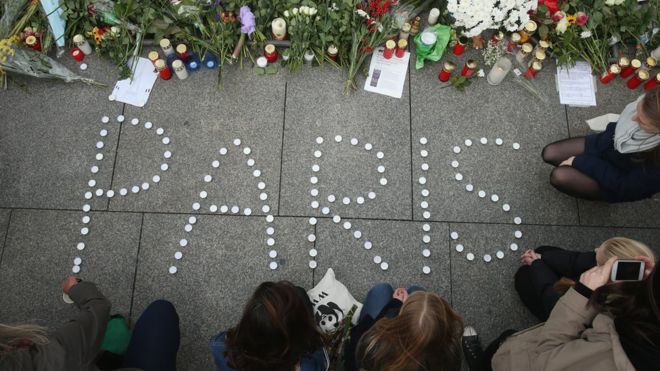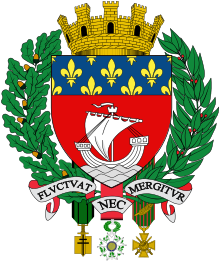posted by Simon Kemp
This week, two responses to the Paris attacks that you may not have seen.
Firstly, an interview with a teacher at a school around the corner from the Bataclan, which is also not far from the Charlie Hebdo offices where this year’s earlier attack took place. Marie Piquemal, a journalist with Liberation went to talk to her over the weekend after the attacks to talk about how she would face her pupils on Monday morning. The full article is here.
«Je veux les aider. Etre avec eux, le plus disponible possible.» Cette maîtresse de CM2 enseigne à Paris, dans une école voisine du Bataclan. Elle ne tient pas à ce que son nom apparaisse de peur que ses élèves (ou leurs parents) lisent et que cela les perturbe «encore plus». Elle fera classe ce lundi matin, comme dans toutes les écoles. Le ministre de l’Intérieur a annoncé samedi soir que tous les établissements scolaires et universitaires rouvriraient lundi, après avoir été fermés samedi.
disponible: literally, ‘available’, but here in the sense of ‘I want to be there for them’
CM2: top year of primary school, for 10-11-year-olds
Elle ne tient pas à ce que son nom apparaisse: she does not want her name to appear (in the newspaper)
Le ministre de l’Intérieur: equivalent post in Government to British Home Secretary
Tout le week-end, elle a essayé de se préparer au maximum. Elle a imprimé des images qui lui serviront de support pour les échanges en classe: un drapeau en berne, la devise de Paris, ce dessin de Joann Sfar avec cette bulle: «Les gens qui sont morts ce soir étaient dehors pour vivre, boire, chanter. Ils ne savaient pas qu’on leur avait déclaré la guerre.» Elle a aussi pris un stock de bougies, la chanson Imagine de John Lennon. «Je verrai avec mes collègues ce qu’on utilise ou pas. Mais j’ai préféré prévoir, pour ne pas me sentir démunie.» Elle ajoute: « On a beau essayer d’anticiper, il va falloir gérer sur le moment. J’espère surtout ne pas avoir de grosse mauvaise nouvelle. On a tenté de joindre toutes les familles, mais il n’a pas été possible de savoir pour tout le monde.»
les échanges en classe: class discussions
en berne: at half-mast
la devise: motto. The motto of Paris is ‘Fluctuat nec mergitur’, which translates as ‘It is tossed in the waves, but it does not sink’. It accompanies the city’s coat of arms, which has the image of a ship:
démunie: at a loss, without resources
gérer sur le moment: play it by ear
Elle raconte aussi que beaucoup de parents, angoissés, ont appelé le directeur pour savoir si la sécurité serait renforcée. La demande a été transmise au rectorat. Une cellule psychologique sera par ailleurs opérationnelle dès lundi matin pour aider les enfants et les parents. Ce sera aussi le cas à l’école du 155 avenue Parmentier, dans le quartier voisin où se trouvent Le Carillon et Le Petit Cambodge, également attaqués vendredi. Et dans tous les établissements «où les élèves, leurs familles et les personnels de l’Éducation ont été particulièrement affectés», précise un communiqué du ministère. Mais aussi dans ceux où l’équipe pédagogique en formulera la demande.
angoissé: anxious
le rectorat: local education authority
la cellule psychologique: psychological support unit
l’équipe pédagogique: the teaching staff
«Les psychologues seront là, c’est précieux», dit encore l’enseignante. Son école est près du Bataclan mais aussi des anciens locaux de Charlie Hebdo. «On a vécu les attentats de janvier. C’était au moment de la sortie des classes, un mercredi midi. Les enfants ont été confinés à l’intérieur, ils s’en souviennent.» Jeudi dernier, l’école a fait l’exercice d’entraînement annuel du «plan de mise en sûreté des écoles face aux risques majeurs» (PPMS). «Les élèves ont posé plein de questions: “Est-ce que ca peut se reproduire?”. Je les ai rassurés du mieux que j’ai pu. Je leur ai dit qu’ils ne risquaient rien. Mais là, cela va être plus difficile. Qu’est ce que je vais leur dire?»
l’enseignante: teacher
les anciens locaux: the former premises
le plan de mise en sûreté des écoles face aux risques majeurs: the security action plan for schools in case of major risk
du mieux que j’ai pu: as best I could
Secondly, a short video. It’s called Cent Maux, which means ‘A Hundred Bad Things’, ‘ A Hundred Evils’ or ‘A Hundred Hurts’. It’s also homophonic for ‘Cent Mots’, ‘a hundred words’, and the video consists of a hundred words (in French and English) responding to the attacks. If that doesn’t sound very engaging to you, then I suggest you give it two minutes of your time and be proved wrong.
[The video seems to be resisting my attempts to embed it in the blog, so you’ll have to go and visit it on its Facebook page here. It’s worth the trip.]




 1. ‘Ta bonne maman ne pourra pas être à Dieppe dimanche. Il lui faudra, au moins, un jour ou deux pour resserrer tout son bataclan.’
1. ‘Ta bonne maman ne pourra pas être à Dieppe dimanche. Il lui faudra, au moins, un jour ou deux pour resserrer tout son bataclan.’  Use in phrases: (Et) tout le bataclan. Et cætera, et tout le reste. Etc., and all the rest
Use in phrases: (Et) tout le bataclan. Et cætera, et tout le reste. Etc., and all the rest


